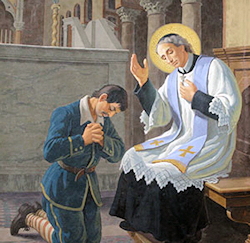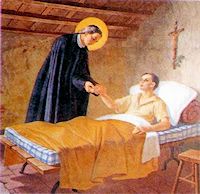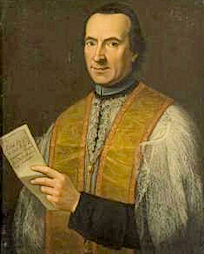Easter: May 23rd
Friday of the Fifth Week of Easter
Other Commemorations: St. John Baptist de Rossi, Priest (RM)
» Enjoy our Liturgical Seasons series of e-books!
The Roman Martyrology commemorates St. John Baptist de Rossi (1698-1764), who was from Genoa, and studied and worked in Rome before becoming a priest there and a canon of Santa Maria in Cosmedin. He worked tirelessly for homeless women, the sick, prisoners and workers, and was a very popular confessor, being called a second Philip Neri.
Meditation for Friday of the Fifth Week of Easter:
Longing for Eternity
1. "Grant to Thy people to love that which Thou commandest and to desire that which Thou dost promise; so that amid the changing things of this world, our hearts may be set where true joys are to be found.” We should long to ascend to heaven and should be absorbed by the desire for eternity.
2. As our high priest our Savior recited this prayer: "Father, I will that where I am, they also whom Thou hast given Me may be with Me. That they may see My glory which Thou hast given Me, because Thou hast loved Me before the creation of the world" (John 17:24). The Father promised that we shall be taken to that place where Jesus is in the glory of the Father. Through our baptism we have become the children of God, "and if sons, heirs also, heirs indeed of God and joint heirs with Christ" (Rom. 8:17). The Lord has prepared a place for us in heaven, that "our fellowship may be with the Father and with His Son Jesus Christ" (I John 1:3); that is, we are to possess and enjoy the life and the fruits of the three divine per-sons, to see God, to repose eternally in the presence of God, to love Him. The joy of God will then be our joy; the life of God will be our life. We shall share a perfect life, in which all our powers will find their most perfect exercise and complete fulfillment. If we could only perceive what things God has prepared for us, what great efforts we would exert to obtain this one thing necessary! Father, grant us to desire with all the powers of our soul the things which Thou hast promised us. Let us forget all worldly things, all that is temporal and passing, and exert ourselves to obtain those things that await us.
"Grant that our hearts may be set where true joys are to be found" (Collect). The baptized soul must linger here on earth, but he allows transitory things to pass by as if they were no concern of his. He possesses them and he makes use of them as if he possessed them not and used them not. All his powers and thoughts and endeavors are concentrated on eternity, on the world above the stars. He lives entirely for the things that are to come when this world has passed away. His mind is occupied with the consideration of future joys, and of the perfect and glorious happiness of eternity. He is assured of possessing it because he possesses the Holy Ghost, and because he has become the son of God through his baptism. It is guaranteed to him by the resurrection and ascension of the Lord, who is the head of the body into which he has been incorporated. "But God (who is rich in mercy), for His exceeding charity wherewith He loved us, even when we were dead in sins, hath quickened us together in Christ (by whose grace you are saved) and hath raised us up together and hath made us sit together in the heavenly places, through Christ Jesus. That He might show in the ages to come the abundant riches of His grace in His bounty towards us in Christ Jesus" (Eph. 2:4-7).
What value can the things of this world have for him who is firmly rooted in a world that is above all transitory, temporal things? He can afford to wait, for the world can never give him peace or enjoyment. He exerts his energies and directs his impulses to rise to higher things, to obtain the one thing necessary, to obtain those things which have a lasting value. Earthly possessions, difficulties and hardships, pain and disappointments, cannot deter him. His treasure is buried in the field of heaven. He has discovered one precious pearl, and he sacrifices all else to purchase this field, this pearl, this blessed eternity. The thought of eternity gives him the strength to sacrifice and struggle, to pardon injuries, and to suffer in patience. He acquires a zeal for the salvation of immortal souls. He learns to sacrifice himself in works of charity, to acquire for his brothers and sisters in Christ the riches of eternal life. The thought of eternity gives him a driving force that is stronger than the memory of earthly joys, more insistent than the cravings of nature, more persistent than self, more enduring than death. "Grant to Thy people... to desire that which Thou dost promise."
3. "Blessed are the poor in spirit. ... Blessed are the meek.... Blessed are they that hunger and thirst after justice....Blessed are the merciful....Blessed are the clean of heart" (Matt. 5:3 ff.). These are the true Christians, heroic souls who are firmly fixed on heaven.
The worldly man delights in "the concupiscence of the flesh, and the concupiscence of the eyes, and the pride of life" (I John 2:16). Unfortunately so many Christians are completely occupied with the things of this world. Easter should find them new men, risen from the dead, with their hearts firmly set on heaven, men of heroism. And yet they will still be lost in the abyss of the old man, spiritual weaklings, worldly men. Thus with the liturgy we pray for them from the depths of our souls, that "our hearts may be set where true joys are to be found." Before we approach the sacred moment of consecration at Mass, the priest admonishes us, Sursum corda: "Lift up your hearts." And we answer, Habemus ad Dominum. Have we indeed lifted up our heart to the Lord? Or have we lifted it up only to earthly affairs, good health, or worthless trifles? Let us consider all things in the light of eternity and ask ourselves under all circumstances: "Of what value is this for eternal life?"
—Benedict Bauer, O.S.B, from The Light of the World, Vol II
St. John Baptist de Rossi

After three years he was called to Rome by a relative, Lorenzo de Rossi, who was canon at St. Mary in Cosmedin. He pursued his studies at the Collegium Romanum under the direction of the Jesuits, and soon became a model by his talents, application to study, and virtue. As a member of the Sodality of the Blessed Virgin and of the Ristretto of the Twelve Apostles established at the college, he led the members in the meetings and pious exercises, in visits to the sick in the hospitals and in other works of mercy, and merited even then the name of apostle.
At the age of sixteen he entered the clerical state. Owing to indiscreet practices of mortification he contracted spells of epilepsy, notwithstanding which he made his course of scholastic philosophy and theology, in the college of the Dominicans, and, with dispensation, was ordained priest on 8 March, 1721. Having reached the desired goal, he bound himself by vow to accept no ecclesiastical benefice unless commanded by obedience. He fulfilled the duties of the sacred ministry by devoting himself to the laborers, herds, and teamsters of the Campagna, preaching to them early in the morning, or late in the evening, at the old Forum Romanum (Campo Vaccino), and by visiting, instructing, and assisting the poor at the hospital of St. Galla. In 1731 he established near St. Galla another hospital as a home of refuge for the unfortunates who wander the city by night ("Rom. Brev.", tr. Bute, Summer, 573).
In 1735 he became titular canon at St. Mary in Cosmedin, and, on the death of Lorenzo two years later, obedience forced him to accept the canonry. The house belonging to it, however, he would not use, but employed the rent for good purposes.
 For a number of years John was afraid, on account of his sickness, to enter the confessional, and it was his custom to send to other priests the sinners whom he had brought to repentance by his instructions and sermons. In 1738 a dangerous sickness befell him, and to regain his health he went to Cività Castellana, a day's journey from Rome. The bishop of the place induced him to hear confessions, and after reviewing his moral theology he received the unusual faculty of hearing confessions in any of the churches of Rome. He showed extraordinary zeal in the exercise of this privilege and spent many hours every day in hearing the confessions of the illiterate and the poor whom he sought in the hospitals and in their homes. He preached to such five and six times a day in churches, chapels, convents, hospitals, barracks, and prison cells, so that he became the apostle of the abandoned, a second Philip Neri, a hunter of souls.
For a number of years John was afraid, on account of his sickness, to enter the confessional, and it was his custom to send to other priests the sinners whom he had brought to repentance by his instructions and sermons. In 1738 a dangerous sickness befell him, and to regain his health he went to Cività Castellana, a day's journey from Rome. The bishop of the place induced him to hear confessions, and after reviewing his moral theology he received the unusual faculty of hearing confessions in any of the churches of Rome. He showed extraordinary zeal in the exercise of this privilege and spent many hours every day in hearing the confessions of the illiterate and the poor whom he sought in the hospitals and in their homes. He preached to such five and six times a day in churches, chapels, convents, hospitals, barracks, and prison cells, so that he became the apostle of the abandoned, a second Philip Neri, a hunter of souls.
In 1763, worn out by such labors and continued ill-health, his strength began to ebb away, and after several attacks of paralysis he died at his quarters in Trinità de' Pellegrini. He was buried in that church under a marble slab at the altar of the Blessed Virgin. God honoured his servant by miracles, and only seventeen years after his death the process of beatification was begun, but the troubled state of Europe during the succeeding years prevented progress in the cause until it was resumed by Pius IX, who on 13 May, 1860, solemnly pronounced his beatification. As new signs still distinguished him, Leo XIII, on 8 December, 1881, enrolled him among the saints.
—Excerpted from The Catholic Encyclopedia
Patronage: of the abandoned
Highlights and Things to Do:
- Read the life of St. John Baptist de Rossi free at Google Books
- Read more about St. John Baptist de Rossi:
- His relics are located in Rome at the Church of San Giovanni Battista de Rossi.






